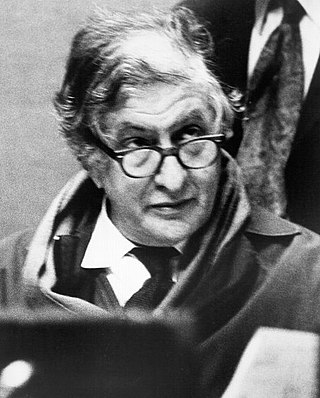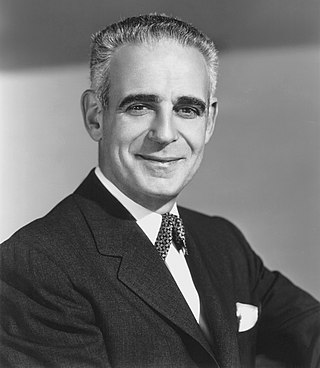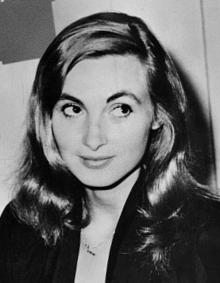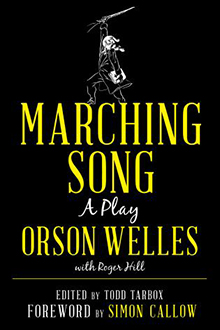
George Orson Welles was an American director, actor, writer, and producer who is remembered for his innovative work in film, radio, and theatre. He is considered to be among the greatest and most influential filmmakers of all time.

"The War of the Worlds" was a Halloween episode of the radio series The Mercury Theatre on the Air directed and narrated by Orson Welles as an adaptation of H. G. Wells's novel The War of the Worlds (1898) that was performed and broadcast live at 8 pm ET on October 30, 1938, over the CBS Radio Network. The episode is infamous for inciting a panic by convincing some members of the listening audience that a Martian invasion was taking place, though the scale of panic is disputed, as the program had relatively few listeners.

Bernard Herrmann was an American composer and conductor best known for his work in composing for films. As a conductor, he championed the music of lesser-known composers. He is widely regarded as one of the greatest film composers. Alex Ross writes that "Over four decades, he revolutionized movie scoring by abandoning the illustrative musical techniques that dominated Hollywood in the 1930s and imposing his own peculiar harmonic and rhythmic vocabulary."

Isaac Woodard Jr. was an American soldier and victim of racial violence. An African-American World War II veteran, on February 12, 1946, hours after being honorably discharged from the United States Army, he was attacked while still in uniform by South Carolina police as he was taking a bus home. The attack and his injuries sparked national outrage and galvanized the civil rights movement in the United States.
Oja Kodar is a Croatian actress, screenwriter and director known as Orson Welles's romantic partner during the later years of his life.

Paul Stewart was an American character actor, director and producer who worked in theatre, radio, films and television. He frequently portrayed cynical and sinister characters throughout his career.

Chimes at Midnight is a 1966 period comedy-drama film written, directed by, and starring Orson Welles. Its plot centers on William Shakespeare's recurring character Sir John Falstaff and his fatherly relationship with Prince Hal, who must choose loyalty to Falstaff or to his father, King Henry IV. The English-language film was an international co-production of Spain, France, and Switzerland.

It's All True is an unfinished Orson Welles feature film comprising three stories about Latin America. "My Friend Bonito" was supervised by Welles and directed by Norman Foster in Mexico in 1941. "Carnaval" and "Jangadeiros" were directed by Welles in Brazil in 1942. It was to have been Welles's third film for RKO Radio Pictures, after Citizen Kane (1941) and The Magnificent Ambersons (1942). The project was a co-production of RKO and the Office of the Coordinator of Inter-American Affairs that was later terminated by RKO.
Moby Dick is a two-act drama by Orson Welles. The play was staged June 16–July 9, 1955, at the Duke of York's Theatre in London, in a production directed by Welles. The original cast included Welles, Christopher Lee, Kenneth Williams, Joan Plowright, Patrick McGoohan, Gordon Jackson, Peter Sallis, and Wensley Pithey. The play was published by Samuel French in 1965.
The Orson Welles Show was an unsold television talk show pilot directed by Orson Welles. It has never been broadcast or released in its entirety. Filming began in September 1978 and the project was completed around February 1979. It ran 74 minutes and was intended for a 90 minute commercial time slot.

The Fountain of Youth is a 1956 television pilot directed by Orson Welles for a proposed Desilu Productions anthology series that was never produced. Based on a short story by John Collier, the short film narrated onscreen by Welles stars Dan Tobin, Joi Lansing and Rick Jason. The Fountain of Youth was televised once, on September 16, 1958, on NBC's Colgate Theatre. It received the prestigious Peabody Award for 1958, the only unsold television pilot ever to be so honored.
The Mercury Wonder Show for Service Men was a 1943 magic-and-variety stage show by the Mercury Theatre, produced by Orson Welles and Joseph Cotten as a morale-boosting entertainment for US soldiers in World War II. Directed by Welles, the show starred Welles, Cotten, Agnes Moorehead and Rita Hayworth, whose part was later filled by Marlene Dietrich. Jean Gabin also worked on the show backstage, as a propman. The show ran to 150 minutes.

This is a comprehensive listing of the radio programs made by Orson Welles. Welles was often uncredited for his work, particularly in the years 1934–1937, and he apparently kept no record of his broadcasts.
Radio is what I love most of all. The wonderful excitement of what could happen in live radio, when everything that could go wrong did go wrong. I was making a couple of thousand a week, scampering in ambulances from studio to studio, and committing much of what I made to support the Mercury. I wouldn't want to return to those frenetic 20-hour working day years, but I miss them because they are so irredeemably gone.

Paola di Gerfalco, Contessa di Gerfalco, better known by her professional name Paola Mori, was an Italian actress and aristocrat, and the third and last wife of Orson Welles.

The Mercury Theatre on the Air is a radio series of live radio dramas created and hosted by Orson Welles. The weekly hour-long show presented classic literary works performed by Welles's celebrated Mercury Theatre repertory company, with music composed or arranged by Bernard Herrmann. The series began July 11, 1938, as a sustaining program on the CBS Radio network, airing Mondays at 9 pm ET. On September 11, the show moved to Sundays at 8 pm.
An Evening with Orson Welles is a series of six short films created in 1970 by Orson Welles, for the exclusive use of Sears, Roebuck & Co. Welles produced the recitations of popular stories for Sears's Avco Cartrivision machines, a pioneering home video system. Four of the films are regarded as lost; as of 2022, two of the films, The Golden Honeymoon and Two Wise Old Men: Socrates and Noah, are known to exist.

The Orson Welles Almanac is a 1944 CBS Radio series directed and hosted by Orson Welles. Broadcast live on the Columbia Pacific Network, the 30-minute variety program was heard Wednesdays at 9:30 p.m. ET January 26 – July 19, 1944. The series was sponsored by Mobilgas and Mobiloil. Many of the shows originated from U.S. military camps, where Welles and his repertory company and guests entertained the troops with a reduced version of The Mercury Wonder Show. The performances of the all-star jazz band that Welles brought together for the show were an important force in the revival of traditional New Orleans jazz in the 1940s.

Marching Song is a play about the legend of abolitionist John Brown, written in 1932 by Orson Welles and Roger Hill. It is most notable for its narrative device of a journalist piecing together a man's life through multiple, contradictory recollections—a framework that Welles would famously employ in his 1941 film, Citizen Kane. Although the play has never been professionally performed, an abridged version of Marching Song was presented in June 1950 at the Woodstock Opera House in Woodstock, Illinois, a world-premiere benefit production by the Todd School for Boys. Rowman & Littlefield will publish the play in August 2019.
Beatrice Giuditta Welles is an American former child actress, known for her roles in the film Chimes at Midnight (1966) and the documentary travelogue In the Land of Don Quixote (1964). The daughter of American filmmaker Orson Welles and Italian actress Paola Mori, she is a former model, radio and TV personality, founder of a cosmetics line and designer of handbags and jewelry.













